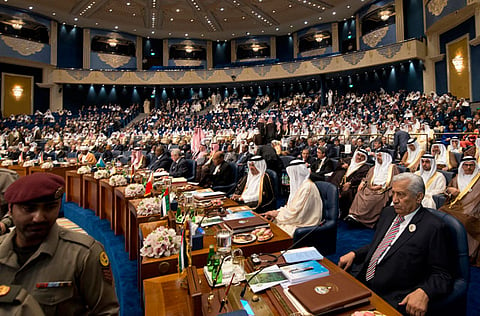Arab Summit: Summit to back rejection of 'Jewish state'
Saudi Arabia calls for 'changing the balance of forces' in Syria as Arab Summit begins in Kuwait

KUWAIT CITY: Saudi Arabia's crown prince on Tuesday said the international community had "betrayed" Syrian rebels by being slow to provide them with arms as they fight to topple President Bashar Al Assad's regime.
Crown Prince Salman Bin Abdul Aaziz, addressing the Arab summit in Kuwait City, said a "legitimate resistance betrayed by the international community and left easy prey to tyrant forces" is facing challenges in the conflict-hit country.
Calls for dialogue in Egypt
KUWAIT CITY: The emir of Qatar called on Tuesday for 'comprehensive dialogue' in Egypt to achieve political stability and insisted on good ties with Cairo, which accuses Doha of supporting banned Islamists.
"We wish Egypt, our elder sister, political stability and all the good for its people," said Shaikh Tamim Bin Hamad Al Thani at the opening of the Arab Summit in Kuwait.
"We stress on the brotherly links we have with Egypt," he said.
Relations between Egypt and the Gulf state have been strained over Doha's backing for Islamist president Mohammad Mursi, who was ousted by the army in July following nationwide protests.
Shaikh Tamim said he hoped that stability in Egypt would be achieved through "a comprehensive dialogue" between the government and all parties, an apparent reference to Mursi's blacklisted Muslim Brotherhood.
Tensions between Qatar and fellow Gulf states have escalated to unprecedented levels when Bahrain, Saudi Arabia, and the UAE recalled their ambassadors from Qatar, accusing Doha of interfering in their internal affairs.
Emir criticises Egypt, Iraq
KUWAIT CITY: Qatar's ruler is critical of Iraq government and Egyptian authorities in an address to an Arab summit in Kuwait.
Shaikh Tamim Bin Hamad Bin Khalifa Al Thani on Tuesday criticized fellow Arab leaders for not following through on a Qatari proposal to set up a $1 billion fund to help the Arab residents of occupied eastern Jerusalem, saying his tiny nation will go ahead with the $250 million it has pledged.
Without naming Iraqi Prime Minister Nouri Al Maliki, he criticized what he says were attempts to sideline entire segments of that Arab nation.
Shaikh Tamim also called on Egypt to start a "political dialogue," an implicit criticism of the crackdown there against the Muslim Brotherhood.
Saudi Arabia calls for 'changing the balance of forces' in Syria
KUWAIT: Saudi Crown Prince Salman called on Tuesday for "changing the balance of forces" on the ground in Syria's civil war, saying the crisis there had reached catastrophic proportions.
"Exiting from the Syrian crisis requires changing the balance of forces on the ground," Prince Salman told the opening session of an annual Arab summit in Kuwait, stressing the need for more support for rebels fighting to overthrow Syrian President Bashar Al Assad.
Arab summit to back rejection of 'Jewish state'
KUWAIT CITY: Arab leaders meeting on Tuesday in Kuwait are expected to back a Palestinian refusal to recognise Israel as a Jewish state, an Israeli demand that threatens to derail peace talks.
The summit stresses a "categorical rejection" of the demand for recognition of Israel as a Jewish state, according to a draft statement endorsed by foreign ministers.
The statement also rejects "all pressures exerted on the Palestinian leadership" to force it into agreeing.
The Arab League has already rejected the demand, in a statement issued from its Cairo headquarters earlier this month.
The Palestinians recognised the state of Israel at the start of the peace process in the early 1990s, but Israeli Prime Minister Benjamin Netanyahu has insisted they now recognise its religious character and give up on the "right of return" of Palestinian refugees.
US Secretary of State John Kerry is facing an uphill battle to keep peace talks on track beyond an April 29 deadline, with the negotiations waylaid over several key issues, including the question of recognition.
Palestinian president Mahmood Abbas has made it clear that he will never recognise Israel as a Jewish state.
Sign up for the Daily Briefing
Get the latest news and updates straight to your inbox


